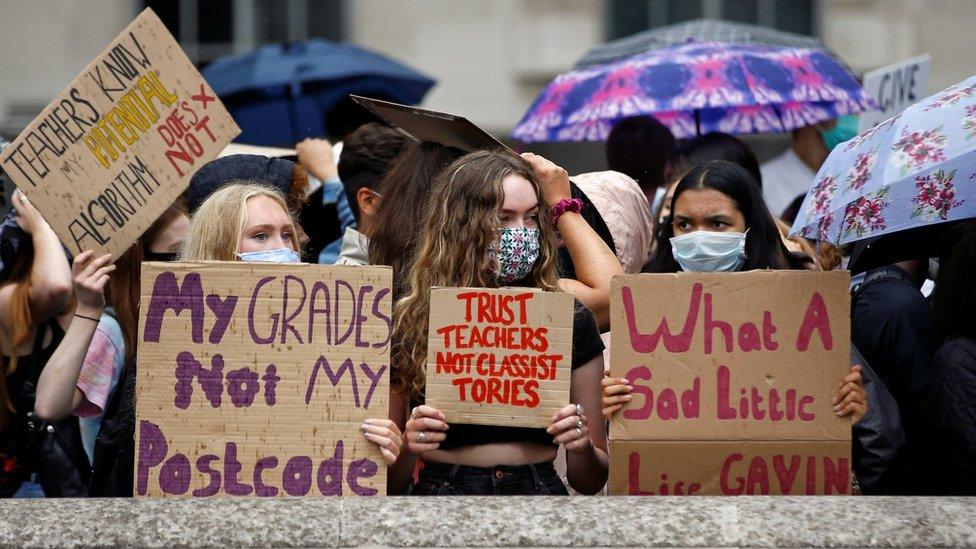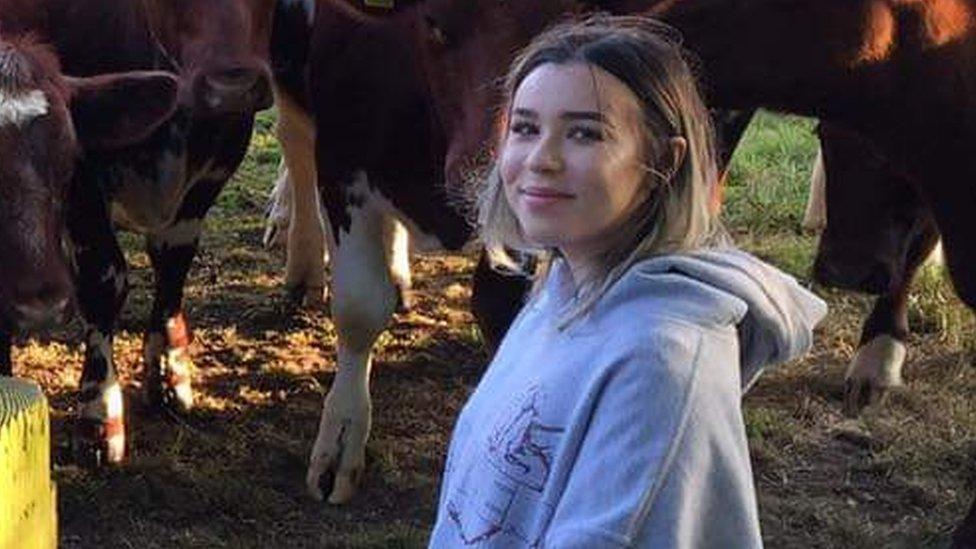A-levels and GCSEs: U-turn as teacher estimates to be used for exam results
- Published
- comments
A-level student Nina welcomes the government's U-turn which means she can train to become a vet
A-level and GCSE students in England will be given grades estimated by their teachers, rather than by an algorithm, after a government U-turn.
It follows uproar after about 40% of A-level results were downgraded by exams regulator Ofqual, which used a formula based on schools' prior grades.
GCSE results in England, Wales and Northern Ireland come out on Thursday.
Ofqual chair Roger Taylor and Education Secretary Gavin Williamson apologised for the "distress" caused.
Teachers' estimates will be awarded to students unless the computer algorithm gave a higher grade.
Mr Williamson said the results of mock exams - which critics said can be inconsistent across different schools - will now not be a key part of the appeals process.
He said students and parents had been affected by "significant inconsistencies" with the grading process.
In a statement, he acknowledged the "extraordinarily difficult" year for students, after exams were cancelled due to the coronavirus pandemic.
He said the Department for Education had worked with Ofqual to design "the fairest possible model" but it had become clear that the process of awarding grades had resulted in "more significant inconsistencies than can be resolved through an appeals process".
"I am sorry for the distress this has caused young people and their parents but hope this announcement will now provide the certainty and reassurance they deserve," said Mr Williamson.
The education secretary told reporters No 10 does not get "any of the detailed data before schools do" but when it saw these "quite concerning outliers" they asked questions.
Mr Williamson said he hoped BTecs would be subject to teacher-assessed grades, and that the government was working with the "awarding authorities" to ensure this happened.
He also revealed the temporary cap on the number of places that universities can offer to students would be lifted.
'Days of confusion'
In a tweet, external, Labour leader Sir Keir Starmer said the government had been "forced into a screeching U-turn after days of confusion".
He criticised Downing Street's handling of students' results as "a complete fiasco" and said its about-face was a "victory for the thousands of young people who have powerfully made their voices heard this past week".
A-level students held protests across the UK in response to grades they said were unfairly awarded.


Analysis by Hannah Richardson, education reporter
For the past decade, Ofqual has held the line against exam grade inflation like a knight of the realm - often using some quite controversial statistical techniques.
But in the case of the class of Covid-19, it could be said the government's desire to maintain standards came at too high a price.
In commissioning the exams regulator to take out an insurance policy in the form of its ill-fated algorithm, that policy arguably went too far, despite ministers' best intentions.
When First Minister Nicola Sturgeon reinstated estimated grades for students in Scotland, it was only a matter of time before the other nations followed suit.
Cue Northern Ireland, then Wales and finally England.
These students are all competing for the same university places, and in the same jobs market after all.
It was only when Education Secretary Gavin Williamson and his deputy Nick Gibb saw how inconsistent the results were that they were forced to relent.
However, the crisis is far from resolved, with tens of thousands of students who thought they had lost their university places likely to get the grades they need after all.
Universities say they will do their best to accommodate them, but it is going to be a tough ask.

Ofqual chair Mr Taylor apologised for the "difficulty" caused to students over its grading system.
He told the BBC: "I would like to say sorry. We have recognised the difficulty that young people have faced coping with the receipt of grades that they were unable to understand the basis on which they had been awarded."
Gavin Williamson: "Incredibly sorry for all those students who have been through this"
He added the regulator realised it had taken "the wrong road" and decided to "change course" after seeing the "anxiety" it had caused to young people and the added "administrative burden on teachers at a time when they need to be preparing for the new school term".

'Thankful and excited'
A-level student Jess Johnson, who stood to lose out on a £16,000 scholarship, said she was "thankful" and "excited" about the change to results.
The 18-year-old needed an A in English to earn a place at St Andrews, along with a £4,000-a-year scholarship, but she was downgraded from her predicted A to a B and was initially told she had been rejected.
That downgrading is now set to be reversed.
Ms Johnson, who studied at Ashton Sixth Form College in Greater Manchester, said: "I think it would have been unfair if (Northern) Ireland, Scotland and Wales made the change and we didn't, so I'm very glad."
However, she questioned why it had taken so long to make the change, after A-level results came out on Thursday, saying "a lot of stress and anxiety" had been caused as a result of the wait.
'I can finally breathe again'
Alaa Muhammad faced missing out on her dream of studying medicine after her A-level results were downgraded.
On hearing the news of the U-turn, she said: "I am ecstatic, I am so so happy. I was so hopeless a couple of days ago and now I feel like I can finally breathe again."
Ms Muhammad, from south-east England, had seen her grades fall from a predicted AAB to EED.
She said she had paid more than £2,000 to take re-sits at a private college after her studies in year 12 and 13 were disrupted. She now hopes she will be able to study medicine at a top university in Pakistan.

Geoff Barton, general secretary of the Association of School and College Leaders (ASCL), welcomed the decision "to put an end to the grading fiasco".
He added the move would mean there was grade inflation, but he said this was a "small price to pay for remedying the manifest injustices" caused by the algorithm.
'Challenges for universities'
Alistair Jarvis, chief executive of Universities UK, said universities were being "as flexible as possible with applicants" but that the "late policy change" has created "challenges".
He called on the government to "step up and support universities", adding that Universities UK was seeking "urgent clarification" on a number of issues.
In a statement, the Universities and Colleges Admissions Service (Ucas) said about 69% of 18-year old applicants across the UK were currently placed with their first-choice university, which it said was "higher than at the same point last year".
It said students who did not have places at their first or insurance choice of university did not need to make their decision immediately.
Ucas said it would be issuing new advice for students and schools, which would be sent directly to students, as soon as they were able to take a decision.
Widespread criticism
The government's handling of exam results has also been criticised by opposition parties and Conservative MPs.
Robert Halfon, the Tory chairman of the commons education select committee, said the government had "serious questions" to answer.
Speaking to the BBC's PM programme, he said he'd hoped No 10 would have developed with Ofqual a "clear, easy to understand [and] fair" system which allowed every pupil to appeal via their head teacher if they believed their grade was unfair.
He said he also hoped that Ofqual would explain its standardisation process to schools; but "none of this had happened" and there were now "serious questions about what on earth has gone on".
Layla Moran, the Liberal Democrats' education spokesperson, said that No 10 had been "dragged, kicking and screaming to this position" and that Mr Williamson "must go."

- Published17 August 2020

- Published15 August 2020

- Published17 August 2020

- Published17 August 2020
